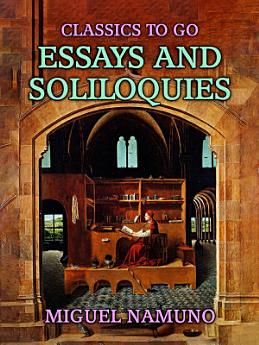Essays and Soliloquies
Sep 2023 · Otbebookpublishing
Ebook
170
Pages
family_home
Eligible
info
reportRatings and reviews aren’t verified Learn More
About this ebook
Essays and Soliloquies (original title in Spanish: "Ensayos y Soliloquios") is a collection of essays and philosophical musings written by Miguel de Unamuno, a prominent Spanish philosopher, writer, and existentialist of the late 19th and early 20th centuries. The book contains a series of Unamuno's thought-provoking essays covering various topics related to existentialism, culture, literature, and the human condition.
About the author
Miguel de Unamuno (1864-1936) was a towering figure in Spanish literature and philosophy, whose work traversed the realms of existentialism, modernism, and the Spanish Generation of '98. Born in Bilbao, Spain, Unamuno's early life was marked by the turbulent Carlist Wars, which profoundly influenced his worldview and literary voice. He became a professor of Greek and later the rector at the University of Salamanca, where his intellectual rigor and fiery oratory made him a beloved yet controversial figure.Unamuno's literary contributions are vast, spanning novels, essays, poetry, and plays. His works often grapple with themes of faith, identity, and the human condition, reflecting his deep existential concerns. He was a vocal critic of both the Spanish monarchy and the rise of fascism, which led to his exile during Miguel Primo de Rivera's dictatorship. His return to Spain was equally tumultuous, culminating in a dramatic confrontation with General Millán-Astray in 1936, where he famously declared, "You will win, but you will not convince."Unamuno's influence extends beyond his lifetime, impacting contemporary writers and thinkers such as Jorge Luis Borges and Gabriel García Márquez. His revolutionary ideas about the "tragic sense of life" and the quest for authenticity resonate with modern readers, who find in his works a timeless exploration of the human spirit's struggles and triumphs. Unamuno's legacy is that of a relentless seeker of truth, a beacon of intellectual courage, and a passionate advocate for the power of the written word to challenge and transform society.
Rate this ebook
Tell us what you think.
Reading information
Smartphones and tablets
Install the Google Play Books app for Android and iPad/iPhone. It syncs automatically with your account and allows you to read online or offline wherever you are.
Laptops and computers
You can listen to audiobooks purchased on Google Play using your computer's web browser.
eReaders and other devices
To read on e-ink devices like Kobo eReaders, you'll need to download a file and transfer it to your device. Follow the detailed Help Center instructions to transfer the files to supported eReaders.








